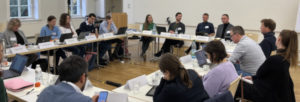On 09 and 10 November, the “International Organizations” Thematic Group of the German Association for Political Science (DVPW) met for its annual conference at the University of Jena to discuss current research on international organizations and their environments.

Dr Sebastian Haug (IDOS) presented a paper on the relationship between the United Nations (UN) and China’s Belt and Road Initiative (BRI). Together with a paper by Prof. Monika Heupel from the University of Bamberg, their panel looked at relational legitimation, i.e. how global actors want to use relationships with each other to strengthen their own legitimacy.
Haug’s paper builds on ongoing IDOS research and explores why relations between BRI and various UN entities first visibly increased before showing a sharp decline. His explanatory approach focuses on the motivations of China and the UN to use their mutual relations to be recognised by UN member states as relevant (UN) and well-intentioned (China) actors. With brief case studies of the UN Environment Programme (UNEP), the UN Development Programme (UNDP) and the UN Industrial Development Organization (UNIDO), the paper shows that opposition from Western states led the UN to almost completely withdraw from its cooperation with BRI. Despite voices that problematise China’s rise at the UN, Haug’s paper shows that for now, Western member states – especially the USA – continue to set the tone across the UN system.

Schreibe einen Kommentar